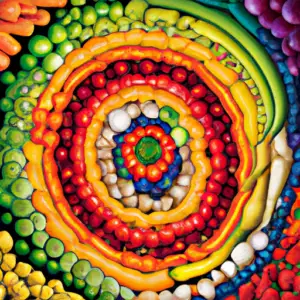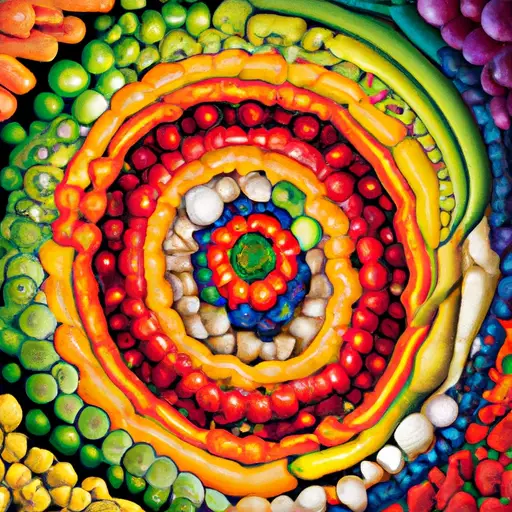Fad Diets: An Overview
Have you heard about the latest fad diet? It seems like there’s a new one popping up every week. But what are fad diets, and why should you know about them?
Well, fad diets can be defined in simple terms as extreme eating plans that promise quick weight loss or other health benefits. And while they may have some short-term results, they often don’t deliver on their promises in the long run. In fact, they can actually be very dangerous to your health if they’re followed for too long.
So before starting any drastic changes to your diet – or even considering a fad diet – it’s important to know what you’re getting into.
Short-term Effects of Fad Diets
Fad diets are a temporary fix for a long-term problem. Sure, they might help you shed a few pounds initially, but that weight could easily come back – and then some. If this isn’t a diet you can stick to in the long run, what’s the point?
While many of us may have heard about the positive short-term effects of fad diets, like losing a few pounds quickly, there are potential pitfalls. Fact is, if your diet is too restrictive, or you are not consuming enough calories, it can throw off your metabolism and cause fatigue.

A lot of fad diets also reduce the amount of food available to your body and can cause nutrient deficiencies. Not getting enough important vitamins, minerals, and macronutrients could fairly quickly lead to problems like hair loss, dry skin, and feeling sluggish.
The bottom line: fad diets can work in the short term, they can even be helpful if you’re trying to jumpstart weight loss. But should you decide to go down that path, make sure you’re doing it with proper medical supervision and really question yourself whether it’s a diet you can realistically keep up.
Long-term Effects of Fad Diets
Fad diets can be harmful in the long term. Many dieters find themselves at risk for a number of illnesses and diseases, due to the lack of essential nutrients. The consequences of following fad diets can be serious and have long-term impacts on your health.
It’s not uncommon to gain back any weight lost while following a fad diet. This can lead to yo-yo dieting, where your weight goes up and down in cycles. Yo-yo dieting has been linked to an increased risk of heart disease, stroke, and other health problems.
As well as gaining the weight back, fad diets don’t provide the body with essential vitamins and minerals that it needs to function properly. This can lead to nutritional deficiencies which can cause medical problems such as anemia, bone loss, and fatigue. A poor diet also leaves you open to illnesses such as diabetes and cancer.
Fad diets can also damage your metabolism and make it harder for you to lose weight in the future. When you restrict your food intake too much, your body starts to conserve calories instead of burning them. This can make it more difficult for you to lose weight, even if you’re eating a healthy diet.
Overall, it’s important to remember that the importance of a balanced diet cannot be overstated. Fad diets may offer quick results, but they’re rarely sustainable and can leave you worse off than before. Without essential nutrients, your body won’t be able to maintain good health in the long term and you’ll be putting yourself at risk for a number of serious illnesses.
Nutritional Deficiencies Associated With Fad Diets
You’ve heard it before: lose weight fast and get into shape with the latest diet. But here’s the thing, that’s not always the best approach. Not all fad diets are healthy and you could be missing out on vital nutrients.
Let’s start off by talking about how fad diets work. Most involve eating a certain type or combination of food in order to reduce overall caloric intake in order to shed excessive weight. That part isn’t really the problem. The issue arises when the diet is unbalanced and does not provide enough vitamins and minerals for your body to function properly.
The result? Nutritional deficiencies. You can take in all the calories that you want, but if you’re not getting the right mix of macro and micro-nutrients, then you’re going to be lacking something. Common deficiencies associated with fad diets include Vitamin B12, Omega-3 fatty acids, and Iron.
The symptoms of these deficiencies can vary, ranging from fatigue and headaches to anemia and digestive issues. Severe cases can even lead to long-term health complications like nerve damage and heart problems. Bottom line, don’t just look at calories when it comes to dieting, pay attention to the micronutrients too!
The Need for Variety and Moderation
As with anything in life, variety and moderation is key when it comes to diets. Eating only one type of food, or following a restrictive diet for a prolonged period of time can easily do more harm than good. The moment you start to exclude certain foods from your routine, you run the risk of developing nutritional deficiencies.
It’s all about balance. Eatin’ too much of one thing is a recipe for disaster — you gotta mix it up every day. Instead of obsessing over carbs and fats and proteins, focus on getting a wide range of nutrients through fruits, vegetables, whole grains, and lean proteins. That way, you get the best of both worlds: the vitamins, minerals, and disease-fighting antioxidants found in produce, and the protein and healthy fat found in lean meats, nuts, and seeds. Just remember: if it sounds too good to be true, it probably is.
So, take it from me: ditch the fad diets and opt for something that emphasizes moderation, balance, and nutrition. It’ll do you a world of good — after all, nobody wants to feel deprived!
Conclusion: Make Eating Fun and Smart
Well, there you have it folks, Fad Diets in a nutshell. This blog post was all about the realities of diets that sound good on paper but don’t always live up to their promises. As we now know, fads diets usually offer short-term results at best while they can also bring long-term consequences like nutritional deficiencies. All this isn’t to say that you shouldn’t consider diets or making changes to your eating habits, just do it smartly.
The important takeaway is that moderation and variety are key when it comes to having a healthy diet. Allow yourself some indulgences here and there and eat foods from as many different food groups as possible. When it comes to health, the best route is to make eating fun, exciting, and sustainable.
At the end of the day, it’s your health and happiness that matter most. Don’t fall for gimmicky fad diets that promise the world yet deliver nothing. Take the time to learn more about nutrition and doing what’s best for you—you won’t regret it!






